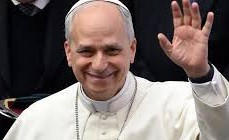Tenth Sunday in Ordinary Time
“He is out of his mind.” Mk. 3:21
“The most important thing in the world is family and love.”
So, states the famous basketball coach, John Wooden.
Michael J. Fox, the TV star, writes:
“Family is not an important thing. It’s the only thing.”
Most of us would heartily agree with both of these quotes. In fact, the mere mention of the word “family” usually awakens within us an astonishing range of memories and associations, of heart wrenching tales of support and encouragement, of feelings and attachments deeply and positively felt and remembered.
That is, of course, if you were graced with a family life that was close and loving.
But what if you came from a family that was abusive and violent? What if you were not blessed with acceptance and encouragement and love? What if, instead, you came from a family that was shrouded in secrets and addiction and abandonment?
Today’s Gospel challenges us with these very questions.
Mark tells us a remarkable story today – one not found in the other Gospel accounts, and one that we can easily find disturbing.
It’s a story about the family of Jesus – a story far different from the one Luke relates, for example, with his beautiful Gospel depiction of Mary and Joseph and the child Jesus.
In contrast, Mark very bluntly reports in today’s Gospel reading how Jesus’ family – his “mother and brothers” – “set out to seize him.”
Why? Because they sincerely believed Jesus was “out of his mind.”
His own family is concerned about Jesus’ mental stability!
But what is possibly even more jarring is the Gospel of Mark’s next scene. He tells us that the “crowd seated around him told him, ‘Your mother and your brothers and your sisters are outside asking for you.’”
Then comes perhaps the most misunderstood words ever reported to come out of the mouth of Jesus:
“Who are my mother and my brothers?”
Jesus then answers his own question:
“Here are my mother and my brothers. For whoever does the will of God is my brother and sister and mother.”
If you come from a close, supportive family, you may have difficulty hearing these words spoken by Jesus. They may even strike you as cruel.
Listeners from loving families might understandably see Jesus as calloused to his own flesh and blood. Yet, if we’re truly honest with ourselves, we may be able to admit that even the most loving families have their limitations. Even such blessed families can become so narrow and self-immersed that they are rendered incapable of sharing abundantly with others. They may become so engrossed in their own immediate concerns that they’re unable to recognize the immensity of human need that stretches all about them.
Listen now, if you will, to the same passage from Mark’s Gospel as someone who was raised in an abusive family, one in which they felt degraded by psychological and physical violence.
“Here are my mother and my brothers. For whoever does the will of God is my brother and sister and mother.”
In this case, Jesus’ words might strike you as a kind of balm:
You are being told by Jesus that you can finally belong to a new kind of family – a family of love and grace; a family for which you have ached all your life.
What now becomes clear is that this story is being told by Mark to lift us up beyond the limitations of personal experience. These words of Jesus invite us to see the larger human community in all its diversity and need and wonder. They can become for us an experience of gracious, tender redemption.
Jesus sets only one criterion for being a member of his new family, his larger family, his redemptive family:
That we do the “will of God.”
Later in his Gospel Jesus outlines for us precisely what his “will” is:
Love God with all that we are. Love our neighbor as ourselves.
If we keep these commandments, Jesus tells us, we will discover the unconditional acceptance and indestructible joy that not even the most loving human family can provide.
If we have been abused by our families, if we have been abandoned by our families, if we have been surrounded by rage and lack of acceptance by our families, we will discover the overflowing grace that can heal our wounds. This is what Jesus is trying to emphasize in this Gospel passage.
Beyond that, we will now have the opportunity to develop a healthy self-love, and an inner affirmation that will free us from the feelings of self-loathing and negativity that abuse and neglect inculcate.
Keeping these two great commandments is THE way of doing the will of God.
More than that even, it is the ultimate road to finding ourselves healed and empowered.
So, far from weakening families, Christ’s statement that “Whoever does the will of God is my brother and sister and mother,” nurtures those very qualities that make us healthy members of our immediate family, and faithful members of the new family of God.
“The most important thing in the world is family and love.”
Jesus, I think, would be the first to agree. That’s why he offers to each of us a new kind of family – one that will be overflowing with grace and joy.




